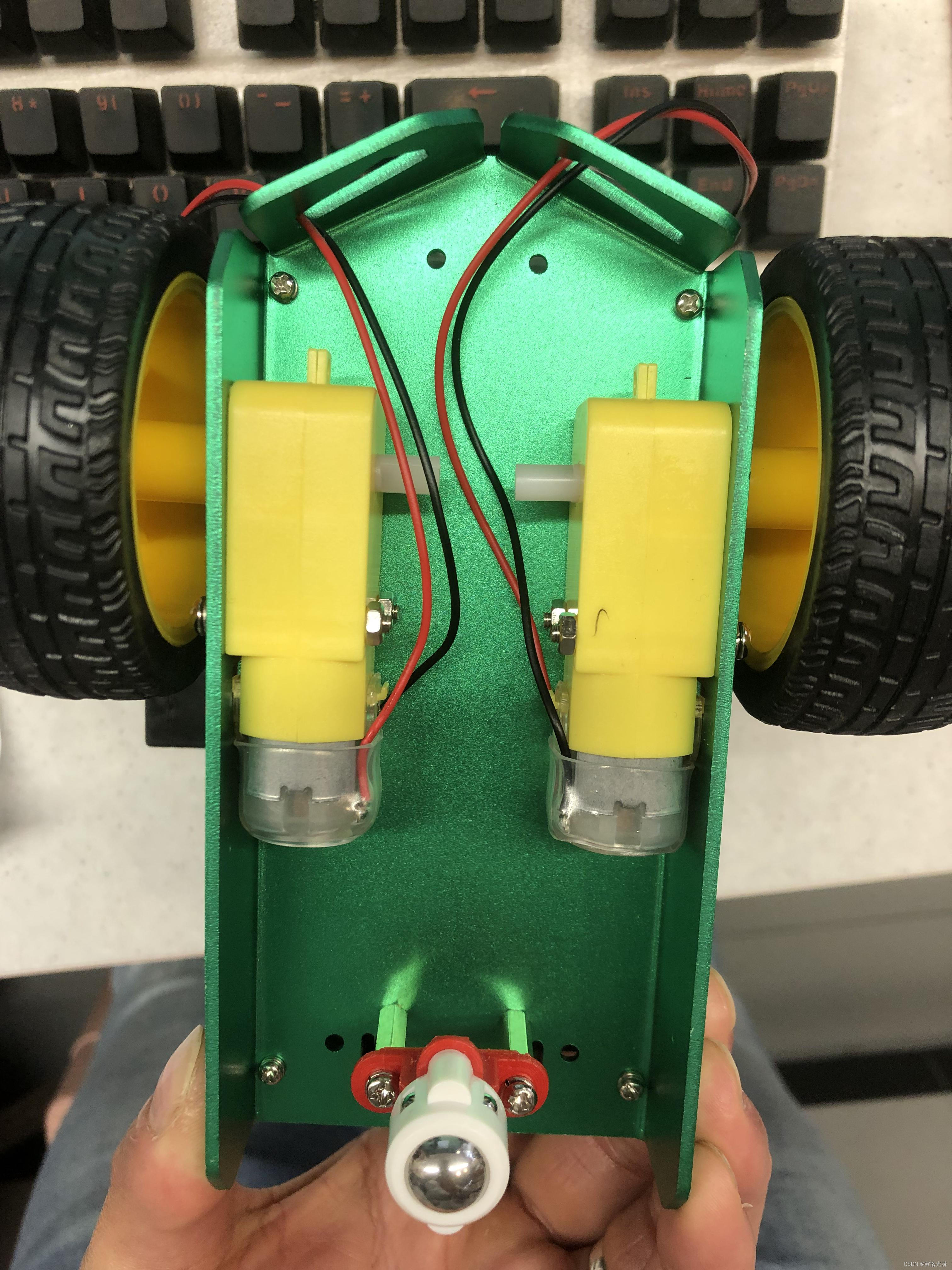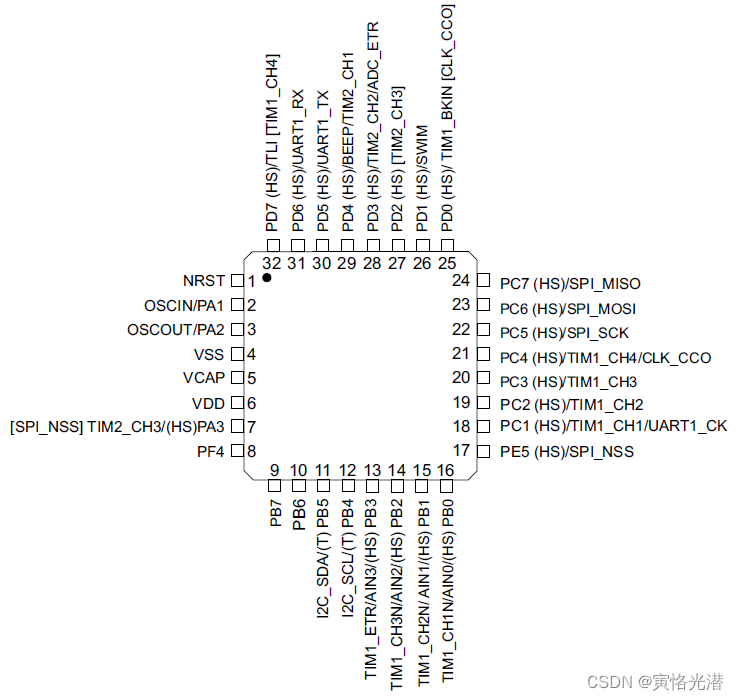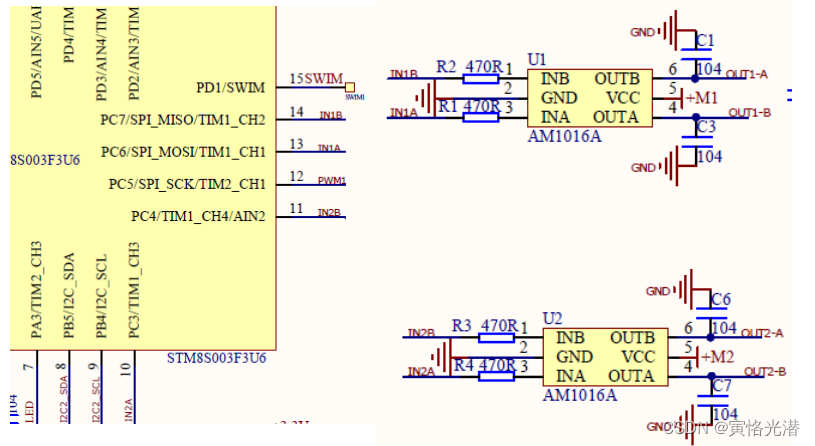Jetson Nano驱动机器人的左右两路电机
创始人
2025-05-30 13:52:33
0次
基于Jetson Nano板子搭建一个无人车,少不了减速电机驱动轮子滚动,那如何驱动呢?

从Jetson.GPIO库文件来说,里面没有支持产生PWM的引脚,也就意味着Jetson nano没有硬件产生PWM的能力,所以我们不得不使用别的方法产生PWM完成驱动控制,而刚好STM8解决了这一问题并且节约了它有限的GPIO资源,我们借助STM8这款MCU作为协处理器,大大增强了Jetson nano的驱动能力,PWM的周期和占空比(在一个脉冲循环内,通电时间相对于总时间所占的比例)都完全可控。
我们来看下它的参数:

我们使用的是上图所示的QFN20封装的STM8,它主要参数特征如下:
1. I2C接口,支持多路PWM输出
2. 内置16MHz晶振,可不连接外部晶振,也可以连接外部晶振
3. 支持2.95V-5.5V电压,最大耐压值5.5V
4. 具有上电复位,以及软件复位等功能

由上图三极管驱动的有源蜂鸣器电路,而三极管控制引脚接在协处理器可知,开启蜂鸣器只需要通过IIC给协处理器对应的指令即可,下面我们看到通讯协议:

在上一篇文章我们演示的蜂鸣器,我们通过IIC向协处理器(地址0x1B)的寄存器0x06发送1即可打开蜂鸣器,发送0即关闭蜂鸣器
bus.write_byte_data(0x1B,0x06,1或0)
同样的给出两路电机的电路图:

我们来实际驱动电机看下,这里电机控制部分用到了Jetbotmini的库:
from jetbotmini import Robot
import time
robot = Robot()print(dir(robot))
#['__class__', '__delattr__', '__dict__', '__dir__', '__doc__', '__eq__', '__format__', '__ge__', '__getattribute__', '__getstate__', '__gt__', '__hash__', '__init__', '__init_subclass__', '__le__', '__lt__', '__module__', '__ne__', '__new__', '__reduce__', '__reduce_ex__', '__repr__', '__setattr__', '__setstate__', '__sizeof__', '__str__', '__subclasshook__', '__weakref__', '_add_notifiers', '_config_changed', '_cross_validation_lock', '_find_my_config', '_instance', '_load_config', '_log_default', '_notify_trait', '_register_validator', '_remove_notifiers', '_trait_default_generators', '_trait_notifiers', '_trait_validators', '_trait_values', '_walk_mro', 'add_traits', 'backward', 'class_config_rst_doc', 'class_config_section', 'class_get_help', 'class_get_trait_help', 'class_own_trait_events', 'class_own_traits', 'class_print_help', 'class_trait_names', 'class_traits', 'clear_instance', 'config', 'cross_validation_lock', 'forward', 'has_trait', 'hold_trait_notifications', 'i2c_bus', 'initialized', 'instance', 'left', 'left_motor', 'left_motor_alpha', 'left_motor_channel', 'log', 'motor_driver', 'notify_change', 'observe', 'on_trait_change', 'parent', 'right', 'right_motor', 'right_motor_alpha', 'right_motor_channel', 'section_names', 'set_motors', 'set_trait', 'setup_instance', 'stop', 'trait_events', 'trait_metadata', 'trait_names', 'traits', 'unobserve', 'unobserve_all', 'update_config']print(dir(robot.left_motor))
#['__class__', '__delattr__', '__dict__', '__dir__', '__doc__', '__eq__', '__format__', '__ge__', '__getattribute__', '__getstate__', '__gt__', '__hash__', '__init__', '__init_subclass__', '__le__', '__lt__', '__module__', '__ne__', '__new__', '__reduce__', '__reduce_ex__', '__repr__', '__setattr__', '__setstate__', '__sizeof__', '__str__', '__subclasshook__', '__weakref__', '_add_notifiers', '_config_changed', '_cross_validation_lock', '_driver', '_find_my_config', '_load_config', '_motor', '_notify_trait', '_observe_value', '_register_validator', '_release', '_remove_notifiers', '_trait_default_generators', '_trait_notifiers', '_trait_validators', '_trait_values', '_write_value', 'add_traits', 'alpha', 'beta', 'class_config_rst_doc', 'class_config_section', 'class_get_help', 'class_get_trait_help', 'class_own_trait_events', 'class_own_traits', 'class_print_help', 'class_trait_names', 'class_traits', 'config', 'cross_validation_lock', 'has_trait', 'hold_trait_notifications', 'notify_change', 'observe', 'on_trait_change', 'parent', 'section_names', 'set_trait', 'setup_instance', 'trait_events', 'trait_metadata', 'trait_names', 'traits', 'unobserve', 'unobserve_all', 'update_config', 'value']#这个转速的范围是[0,1],不过我设置成0.1也没有转,设置成0.2及以上才转,不知道是不是电量不是很足的原因了。
robot.left_motor.value = 0.8
robot.right_motor.value = 0.8
#这样就可以让电机转动了,很简单,然后做停止电机的操作
robot.left_motor.value = 0
robot.right_motor.value = 0
#或者直接将robot停止也可以
#robot.stop()这段赋值左右马达的意思就是,控制电机速度的值的范围是0~1.0,即代表给出的PWM的占空比为0~100%,所以赋值为0,就是把输出给电机的PWM占空比设置为0,这样就关闭了电机

更多的robot实例方法可以自行查阅源码:
Help on Robot in module jetbotmini.robot object:class Robot(traitlets.config.configurable.SingletonConfigurable)| A configurable that only allows one instance.| | This class is for classes that should only have one instance of itself| or *any* subclass. To create and retrieve such a class use the| :meth:`SingletonConfigurable.instance` method.| | Method resolution order:| Robot| traitlets.config.configurable.SingletonConfigurable| traitlets.config.configurable.LoggingConfigurable| traitlets.config.configurable.Configurable| traitlets.traitlets.HasTraits| traitlets.traitlets.HasDescriptors| builtins.object| | Methods defined here:| | __init__(self, *args, **kwargs)| Create a configurable given a config config.| | Parameters| ----------| config : Config| If this is empty, default values are used. If config is a| :class:`Config` instance, it will be used to configure the| instance.| parent : Configurable instance, optional| The parent Configurable instance of this object.| | Notes| -----| Subclasses of Configurable must call the :meth:`__init__` method of| :class:`Configurable` *before* doing anything else and using| :func:`super`::| | class MyConfigurable(Configurable):| def __init__(self, config=None):| super(MyConfigurable, self).__init__(config=config)| # Then any other code you need to finish initialization.| | This ensures that instances will be configured properly.| | backward(self, speed=1.0)| | forward(self, speed=1.0, duration=None)| | left(self, speed=1.0)| | right(self, speed=1.0)| | set_motors(self, left_speed, right_speed)| | stop(self)| | ----------------------------------------------------------------------| Data descriptors defined here:| | i2c_bus| An int trait.| | left_motor| A trait whose value must be an instance of a specified class.| | The value can also be an instance of a subclass of the specified class.| | Subclasses can declare default classes by overriding the klass attribute| | left_motor_alpha| A float trait.| | left_motor_channel| An int trait.| | right_motor| A trait whose value must be an instance of a specified class.| | The value can also be an instance of a subclass of the specified class.| | Subclasses can declare default classes by overriding the klass attribute| | right_motor_alpha| A float trait.| | right_motor_channel| An int trait.| | ----------------------------------------------------------------------| Class methods inherited from traitlets.config.configurable.SingletonConfigurable:| | clear_instance() from traitlets.traitlets.MetaHasTraits| unset _instance for this class and singleton parents.| | initialized() from traitlets.traitlets.MetaHasTraits| Has an instance been created?| | instance(*args, **kwargs) from traitlets.traitlets.MetaHasTraits| Returns a global instance of this class.| | This method create a new instance if none have previously been created| and returns a previously created instance is one already exists.| | The arguments and keyword arguments passed to this method are passed| on to the :meth:`__init__` method of the class upon instantiation.| | Examples| --------| | Create a singleton class using instance, and retrieve it::| | >>> from traitlets.config.configurable import SingletonConfigurable| >>> class Foo(SingletonConfigurable): pass| >>> foo = Foo.instance()| >>> foo == Foo.instance()| True| | Create a subclass that is retrived using the base class instance::| | >>> class Bar(SingletonConfigurable): pass| >>> class Bam(Bar): pass| >>> bam = Bam.instance()| >>> bam == Bar.instance()| True| | ----------------------------------------------------------------------| Data descriptors inherited from traitlets.config.configurable.LoggingConfigurable:| | log| A trait whose value must be an instance of a specified class.| | The value can also be an instance of a subclass of the specified class.| | Subclasses can declare default classes by overriding the klass attribute| | ----------------------------------------------------------------------| Methods inherited from traitlets.config.configurable.Configurable:| | update_config(self, config)| Update config and load the new values| | ----------------------------------------------------------------------| Class methods inherited from traitlets.config.configurable.Configurable:| | class_config_rst_doc() from traitlets.traitlets.MetaHasTraits| Generate rST documentation for this class' config options.| | Excludes traits defined on parent classes.| | class_config_section() from traitlets.traitlets.MetaHasTraits| Get the config class config section| | class_get_help(inst=None) from traitlets.traitlets.MetaHasTraits| Get the help string for this class in ReST format.| | If `inst` is given, it's current trait values will be used in place of| class defaults.| | class_get_trait_help(trait, inst=None) from traitlets.traitlets.MetaHasTraits| Get the help string for a single trait.| | If `inst` is given, it's current trait values will be used in place of| the class default.| | class_print_help(inst=None) from traitlets.traitlets.MetaHasTraits| Get the help string for a single trait and print it.| | section_names() from traitlets.traitlets.MetaHasTraits| return section names as a list| | ----------------------------------------------------------------------| Data descriptors inherited from traitlets.config.configurable.Configurable:| | config| A trait whose value must be an instance of a specified class.| | The value can also be an instance of a subclass of the specified class.| | Subclasses can declare default classes by overriding the klass attribute| | parent| A trait whose value must be an instance of a specified class.| | The value can also be an instance of a subclass of the specified class.| | Subclasses can declare default classes by overriding the klass attribute| | ----------------------------------------------------------------------| Methods inherited from traitlets.traitlets.HasTraits:| | __getstate__(self)| | __setstate__(self, state)| | add_traits(self, **traits)| Dynamically add trait attributes to the HasTraits instance.| | has_trait(self, name)| Returns True if the object has a trait with the specified name.| | hold_trait_notifications(self)| Context manager for bundling trait change notifications and cross| validation.| | Use this when doing multiple trait assignments (init, config), to avoid| race conditions in trait notifiers requesting other trait values.| All trait notifications will fire after all values have been assigned.| | notify_change(self, change)| | observe(self, handler, names=traitlets.All, type='change')| Setup a handler to be called when a trait changes.| | This is used to setup dynamic notifications of trait changes.| | Parameters| ----------| handler : callable| A callable that is called when a trait changes. Its| signature should be ``handler(change)``, where ``change`` is a| dictionary. The change dictionary at least holds a 'type' key.| * ``type``: the type of notification.| Other keys may be passed depending on the value of 'type'. In the| case where type is 'change', we also have the following keys:| * ``owner`` : the HasTraits instance| * ``old`` : the old value of the modified trait attribute| * ``new`` : the new value of the modified trait attribute| * ``name`` : the name of the modified trait attribute.| names : list, str, All| If names is All, the handler will apply to all traits. If a list| of str, handler will apply to all names in the list. If a| str, the handler will apply just to that name.| type : str, All (default: 'change')| The type of notification to filter by. If equal to All, then all| notifications are passed to the observe handler.| | on_trait_change(self, handler=None, name=None, remove=False)| DEPRECATED: Setup a handler to be called when a trait changes.| | This is used to setup dynamic notifications of trait changes.| | Static handlers can be created by creating methods on a HasTraits| subclass with the naming convention '_[traitname]_changed'. Thus,| to create static handler for the trait 'a', create the method| _a_changed(self, name, old, new) (fewer arguments can be used, see| below).| | If `remove` is True and `handler` is not specified, all change| handlers for the specified name are uninstalled.| | Parameters| ----------| handler : callable, None| A callable that is called when a trait changes. Its| signature can be handler(), handler(name), handler(name, new),| handler(name, old, new), or handler(name, old, new, self).| name : list, str, None| If None, the handler will apply to all traits. If a list| of str, handler will apply to all names in the list. If a| str, the handler will apply just to that name.| remove : bool| If False (the default), then install the handler. If True| then unintall it.| | set_trait(self, name, value)| Forcibly sets trait attribute, including read-only attributes.| | setup_instance(self, *args, **kwargs)| This is called **before** self.__init__ is called.| | trait_metadata(self, traitname, key, default=None)| Get metadata values for trait by key.| | trait_names(self, **metadata)| Get a list of all the names of this class' traits.| | traits(self, **metadata)| Get a ``dict`` of all the traits of this class. The dictionary| is keyed on the name and the values are the TraitType objects.| | The TraitTypes returned don't know anything about the values| that the various HasTrait's instances are holding.| | The metadata kwargs allow functions to be passed in which| filter traits based on metadata values. The functions should| take a single value as an argument and return a boolean. If| any function returns False, then the trait is not included in| the output. If a metadata key doesn't exist, None will be passed| to the function.| | unobserve(self, handler, names=traitlets.All, type='change')| Remove a trait change handler.| | This is used to unregister handlers to trait change notifications.| | Parameters| ----------| handler : callable| The callable called when a trait attribute changes.| names : list, str, All (default: All)| The names of the traits for which the specified handler should be| uninstalled. If names is All, the specified handler is uninstalled| from the list of notifiers corresponding to all changes.| type : str or All (default: 'change')| The type of notification to filter by. If All, the specified handler| is uninstalled from the list of notifiers corresponding to all types.| | unobserve_all(self, name=traitlets.All)| Remove trait change handlers of any type for the specified name.| If name is not specified, removes all trait notifiers.| | ----------------------------------------------------------------------| Class methods inherited from traitlets.traitlets.HasTraits:| | class_own_trait_events(name) from traitlets.traitlets.MetaHasTraits| Get a dict of all event handlers defined on this class, not a parent.| | Works like ``event_handlers``, except for excluding traits from parents.| | class_own_traits(**metadata) from traitlets.traitlets.MetaHasTraits| Get a dict of all the traitlets defined on this class, not a parent.| | Works like `class_traits`, except for excluding traits from parents.| | class_trait_names(**metadata) from traitlets.traitlets.MetaHasTraits| Get a list of all the names of this class' traits.| | This method is just like the :meth:`trait_names` method,| but is unbound.| | class_traits(**metadata) from traitlets.traitlets.MetaHasTraits| Get a ``dict`` of all the traits of this class. The dictionary| is keyed on the name and the values are the TraitType objects.| | This method is just like the :meth:`traits` method, but is unbound.| | The TraitTypes returned don't know anything about the values| that the various HasTrait's instances are holding.| | The metadata kwargs allow functions to be passed in which| filter traits based on metadata values. The functions should| take a single value as an argument and return a boolean. If| any function returns False, then the trait is not included in| the output. If a metadata key doesn't exist, None will be passed| to the function.| | trait_events(name=None) from traitlets.traitlets.MetaHasTraits| Get a ``dict`` of all the event handlers of this class.| | Parameters| ----------| name: str (default: None)| The name of a trait of this class. If name is ``None`` then all| the event handlers of this class will be returned instead.| | Returns| -------| The event handlers associated with a trait name, or all event handlers.| | ----------------------------------------------------------------------| Data descriptors inherited from traitlets.traitlets.HasTraits:| | cross_validation_lock| A contextmanager for running a block with our cross validation lock set| to True.| | At the end of the block, the lock's value is restored to its value| prior to entering the block.| | ----------------------------------------------------------------------| Static methods inherited from traitlets.traitlets.HasDescriptors:| | __new__(cls, *args, **kwargs)| Create and return a new object. See help(type) for accurate signature.| | ----------------------------------------------------------------------| Data descriptors inherited from traitlets.traitlets.HasDescriptors:| | __dict__| dictionary for instance variables (if defined)| | __weakref__| list of weak references to the object (if defined)
相关内容
热门资讯
旅游酒店板块震荡下挫,西域旅游...
11月13日消息,早盘旅游酒店板块震荡下挫,西域旅游、君亭酒店跌超10%,金马游乐、峨眉山、众信旅游...
OpenAI联合创始人兼前总裁...
11月13日消息,OpenAI联合创始人兼前总裁格雷格·布罗克曼(Greg Brockman)当地时...
中信证券:大类资产配置顺序为股...
11月13日消息,中信证券研报指出,展望2025年,海外经济或呈现内需复苏潜力与外贸摩擦风险共存的特...
阿斯利康CEO:不了解中国高管...
11月13日消息,阿斯利康CEO苏博科在一场面向投资者和分析师的线上会上强调道:“关于中国的事情,我...
国内期货主力合约涨跌互现,集运...
11月13日消息,国内期货主力合约涨跌互现,集运指数(欧线)、燃料油、纯碱、沪铅、纸浆涨超1%。跌幅...
已有12所985大学,海南还想...
本文来源:时代周报 作者:曾思怡受海南自贸港政策和制度优势吸引,已有一大波国内外高校奔赴海南开设分校...
新中式糖水正席卷年轻人:20一...
新消费导读深圳福田CBD的麦记牛奶公司,工作日晚间十点依然有人排队。点单率最高的不是奶茶,而是一碗需...
“火腿大王”二代接班,豪赌芯片...
从“火腿大王”到“牛散岳父”,再到“莆田卖车富豪”,这家“火腿第一股”的实控人座位,烫得没人能坐久。...
特斯拉,创历史新高
12月22日,特斯拉盘初快速拉升,截至发稿,股价涨超3%,创历史新高,最新市值1.7万亿美元。 编...
男子楼顶露台种树时不慎碰下树桩...
六旬男子韦某在自家楼顶露台移植树木时,起身过程中将一个17公斤重的树桩碰掉坠至楼下,刚好砸中一名17...
